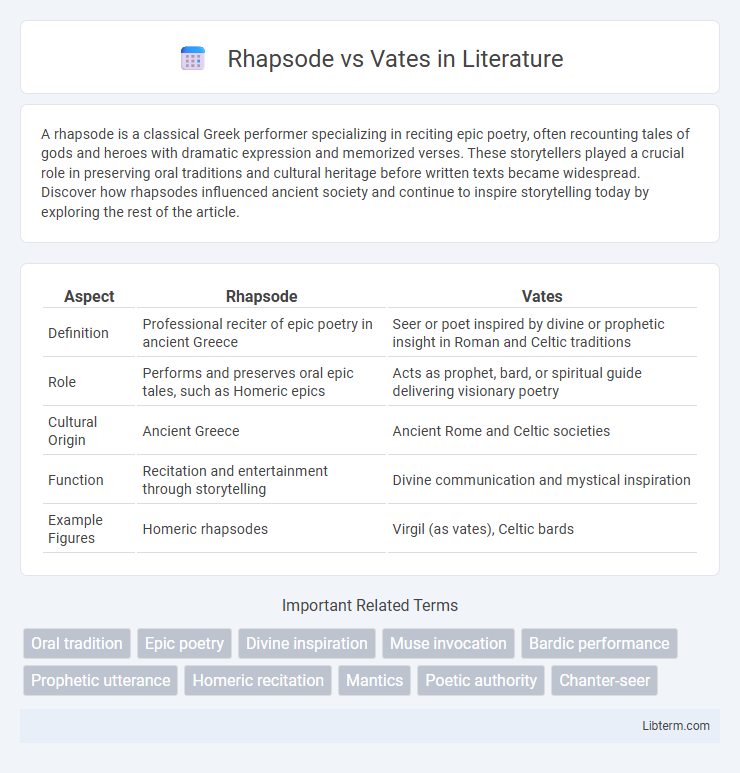A rhapsode is a classical Greek performer specializing in reciting epic poetry, often recounting tales of gods and heroes with dramatic expression and memorized verses. These storytellers played a crucial role in preserving oral traditions and cultural heritage before written texts became widespread. Discover how rhapsodes influenced ancient society and continue to inspire storytelling today by exploring the rest of the article.
Table of Comparison
| Aspect | Rhapsode | Vates |
|---|---|---|
| Definition | Professional reciter of epic poetry in ancient Greece | Seer or poet inspired by divine or prophetic insight in Roman and Celtic traditions |
| Role | Performs and preserves oral epic tales, such as Homeric epics | Acts as prophet, bard, or spiritual guide delivering visionary poetry |
| Cultural Origin | Ancient Greece | Ancient Rome and Celtic societies |
| Function | Recitation and entertainment through storytelling | Divine communication and mystical inspiration |
| Example Figures | Homeric rhapsodes | Virgil (as vates), Celtic bards |
Introduction to Rhapsode and Vates
Rhapsodes were ancient Greek performers specializing in the oral recitation of epic poetry, notably Homeric epics, preserving and transmitting cultural narratives through memorized verses. Vates, in contrast, were prophetic poets or seers in Roman and Celtic traditions, believed to communicate divine insights and religious teachings via inspired poetry. The roles of rhapsode and vates highlight distinct functions in ancient societies: the rhapsode as a custodian of epic literature and the vates as a spiritual intermediary conveying sacred knowledge.
Origins and Etymology of Rhapsode
Rhapsode derives from the Greek word "rhapsoidos," combining "rhaptein" (to stitch) and "aoide" (singing), reflecting its origin as a performer who stitched together epic poems through oral recitation. Unlike the vates, a term rooted in Latin and associated with prophetic or poetic inspiration, rhapsodes were specialized in the formalized, performative transmission of Homeric epics during ancient Greek festivals. This etymology highlights the rhapsode's role as a reciter and cultural preserver, distinct from the visionary or divinely inspired figure represented by the vates.
Historical Background of Vates
The term "vates" originates from ancient Latin, referring to seers or prophets who held significant religious and poetic roles in early Roman society, believed to possess divine inspiration and foresight. Historically, vates were distinct from rhapsodes, who were primarily performers recounting epic poetry orally without prophetic attributes, while vates combined poetic composition with ritualistic and divinatory functions. This dual role influenced the shaping of early Western literary and religious traditions, blending poetry with spiritual insight.
Role and Function: Rhapsode in Ancient Greece
Rhapsodes in Ancient Greece served as professional performers who recited epic poetry, such as Homeric works, to entertain and educate audiences during festivals and public gatherings. Their role involved memorizing and delivering lengthy poetic compositions with precise intonation, preserving oral tradition and cultural heritage. Unlike vates, who were prophetic poets with spiritual authority, rhapsodes primarily functioned as skilled reciters and storytellers maintaining literary continuity.
Role and Function: Vates in Ancient Rome
In Ancient Rome, the vates served as prophetic poets and seers, bridging religious and cultural spheres by delivering divine revelations through poetic form. Unlike rhapsodes, who primarily performed and recited epic poetry for entertainment and preservation of tradition, vates held a distinct role in interpreting omens and guiding public and private decisions. Their function combined spiritual authority with literary artistry, influencing political and religious practices.
Artistic Expression: Performance Styles
Rhapsodes specialized in epic poetry recitation, delivering structured and rhythmic narratives that emphasized memorization and oral tradition. Vates, often associated with prophetic and visionary inspiration, embraced a more spontaneous and emotionally charged performance style, blending poetry with chant and mystical elements. The contrast highlights rhapsodes' technical mastery of storytelling versus vates' immersive, prophetic artistic expression.
Influence on Poetry and Literature
Rhapsodes were performers who recited epic poetry in ancient Greece, directly influencing oral tradition by preserving and disseminating Homeric texts, while vates were prophetic poets in Rome whose visionary insights shaped the thematic depth and religious significance of Latin literature. The rhapsode's emphasis on vocal artistry and memorization contributed to the endurance of epic narratives, whereas the vates infused poetry with spiritual and moral authority, impacting genres such as lyric and elegiac poetry. Their contrasting roles highlight the evolution from oral epic recitation to inspired poetic creation, shaping classical literary heritage.
Cultural and Religious Significance
Rhapsodes were ancient Greek performers who recited epic poetry, such as the works of Homer, playing a crucial role in preserving cultural history through oral tradition. Vates, in contrast, were prophetic figures in Roman and Celtic societies, serving as intermediaries between the divine and human realms, often associated with religious rituals and spiritual guidance. The cultural significance of rhapsodes lies in their contribution to literary heritage and communal identity, while vates hold profound religious importance, embodying divination and sacred authority.
Key Differences: Rhapsode vs Vates
Rhapsodes were ancient Greek performers who memorized and recited epic poetry, particularly the works of Homer, emphasizing oral tradition and dramatic presentation. Vates, in contrast, were prophetic poets or seers in Roman and early Latin literature, known for delivering divine or mystical insights through their verses. The key difference lies in the rhapsode's role as an oral storyteller preserving cultural epics versus the vates' function as a spiritual prophet conveying supernatural knowledge.
Legacy and Modern Interpretations
Rhapsodes, ancient Greek performers, preserved oral traditions by reciting epic poetry like Homer's Iliad, cementing a legacy of storytelling rooted in performance and memorization. Vates, classical Roman poets and seers, combined poetic artistry with prophecy, influencing early literary and cultural views of divine inspiration. Modern interpretations distinguish rhapsodes as entertainers of fixed oral texts, while vates are seen as visionary creators merging poetic craft with spiritual insight, shaping different facets of literary heritage.
Rhapsode Infographic

 libterm.com
libterm.com